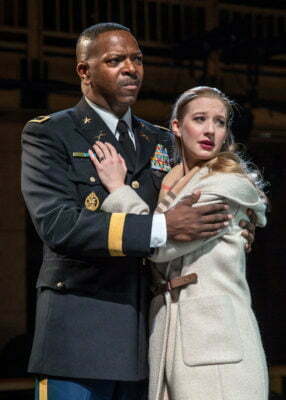Othello (Shakespeare 400 Chicago)
By William Shakespeare
Directed by Jonathan Munby
Produced by Chicago Shakespeare Theater
Shakespeare’s Othello is Still Full of Surprises
After a string of successes for the Shakespeare 400 Festival, our own Chicago Shakespeare Theater is finally mounting its first original production of the year, and it’s magnificent. The Tragedy of Othello, the Moor of Venice is one of the entries in Shakespeare’s body of work which is receiving the most attention over the course of the festival; the Q Brothers, whose Christmas Carol returned to Navy Pier over the holidays, will also be reviving their Othello adaptation later this year, and the Hamburg Ballet recently visited the Harris Theater with theirs. But for the text itself, a better display could hardly be found than this modern-dress production envisioned by British director Jonathan Munby. Though Othello is a simple story which takes a long time to unfold, James Vincent Meredith in the title role and Michael Milligan as Iago are so fascinating to watch that the time flies by, and Shakespeare’s language sounds fully alive.

Iago, as he is quick to tell his flunky, Roderigo (Fred Geyer), hates his commander, Othello. When an opening on Othello’s staff opened up recently, Othello promoted Michael Cassio (Luigi Sottile), a man with academic credentials and not much else, over the much more experienced Iago. (In the original text, Iago claims “have looked upon the world four times seven years,” but Munby changes it to “six times seven.”) Roderigo says he is in love with Desdemona (Bethany Jillard), the young, white Venetian girl Othello has just married, and Iago perceives an opportunity to take revenge on Othello by stirring up racial tension. That plan is partially thwarted when the Duke (Melissa Carlson) decides Othello is too crucial an asset for defending Cyprus from the Turks to be disciplined for marrying without permission, but Iago conceals his betrayal, and now sees Othello’s sex-life as the key to destroying him.

When Othello and his retinue arrive to take command in Cyprus, Iago notices the friendliness between Desdemona and Cassio, and engenders a plot to destroy Cassio, as well. Pretending to be friendly, he pressures Cassio into getting drunk and disgracing himself. He then advises Cassio to regain his reputation with Othello by using Desdemona as an advocate. Meanwhile, Iago subtly plants the idea in Othello’s mind that Cassio and Desdemona are having an affair. Partly by exploiting lucky circumstances and partly due to Othello’s insecurity and paranoia, Iago’s plan succeeds. Othello vows to take terrible revenge, and Iago promises to assist him like a good friend should.

Meredith, as Othello, begins the play seeming to be a sensible, good-humored man of enormous patience. Because Othello does not have nearly as many asides as Iago, we only gradually come to see that this is as much as false outward self as Iago’s honesty; the real Othello is wrathful, whiny, and extremely dangerous. Fight choreographer Matt Hawkins has designed several hair-raising moments, but one of the finest is right before intermission, when Othello attacks Iago. As the most famous villain in theatre, Milligan is disturbingly realistic. Time and time again, he makes Iago’s half-truths and observations sound reasonable and persuasive. No magically far-sighted schemer, he lives in the moment, using only slight suggestions, which are as much in his face and body language as his words, to spin things his way. In the three-hour long play, Othello and Iago don’t get many chances to focus directly on each other, but when they do, the results are engrossing.

Though Jessie Fisher’s skills as an actress are well-known to Chicago theatre-goers, it was a pleasant surprise to see how much she makes of her role as Iago’s wife, Emilia. In Munby’s vision, Emilia is also a soldier, and it seems during her first conversation with Desdemona that they had hardly known each other before. Therefore, Emilia’s allegiance is initially whole-heartedly with Iago, and she is the character who undergoes the greatest change. Luigi Sottile, as Cassio, seems exactly the street-dumb golden boy Iago describes him as, and Iago is as surprised as anybody to see what happens when he gets drunk. Bethany Jillard’s Desdemona is immature, but is able to hide it at times. She seems eager to prove she’s not a silly girl who was taken in by Othello’s tall tales, and yet, she is weirdly resistant to acknowledging the danger of her situation after Othello explicitly threatens her. There are a whole lot of characters who are not what they are.

Though Munby’s modern setting does not revolutionize the play, it does remove a potential barrier between the characters and the audience. Inevitably, the focus will be on Iago, who has by far the most lines, but Munby begins the play with Othello and Desdemona’s marriage. One only needs to take a single look at the brutalist façade Alexander Dodge has designed to represent her home in Venice to understand why Desdemona leapt at the chance for adventure. Lindsay Jones’s sound design works mightily to convince us that the Turkish invasion of Cyprus matters, but even for those who know the story, it is possible to get caught up in the moment. Philip Rosenberg’s flood lights are a realistic part of the set which, rather than highlighting its artifice, makes it and Linda Cho’s camouflage military costumes blend in much more with the fog of war.
 Once the play transitions to Cyprus, we see nothing but the utilitarian, stark military base. There, the risk of violence is omnipresent, and yet, there is nothing that resembles romantic notions of glory. A common complaint about Othello is that the plot is linear, but slow-moving. Munby raises the tension before intermission in fits and starts, choosing to focus on building his characters. The pay-off is well worth it. Though his cast’s interpretation of Othello, Iago, and the rest is not definitive, their choices during the two climactic scenes of violence provide immensely satisfying insight into each of these ambiguous, multi-faceted characters. Shakespeare was a fully mature dramatist and poet when he wrote Othello, and the cast delivers some of his best language rivetingly. Those who are new to the play will have an ideal introduction to it at Chicago Shakespeare, and those who know it will find it still holds surprises.
Once the play transitions to Cyprus, we see nothing but the utilitarian, stark military base. There, the risk of violence is omnipresent, and yet, there is nothing that resembles romantic notions of glory. A common complaint about Othello is that the plot is linear, but slow-moving. Munby raises the tension before intermission in fits and starts, choosing to focus on building his characters. The pay-off is well worth it. Though his cast’s interpretation of Othello, Iago, and the rest is not definitive, their choices during the two climactic scenes of violence provide immensely satisfying insight into each of these ambiguous, multi-faceted characters. Shakespeare was a fully mature dramatist and poet when he wrote Othello, and the cast delivers some of his best language rivetingly. Those who are new to the play will have an ideal introduction to it at Chicago Shakespeare, and those who know it will find it still holds surprises.
Highly Recommended
Jacob Davis
[email protected]
Reviewed February 25, 2016
This show has been Jeff recommended.
For more information, see Othello’s page on Theatre in Chicago.
Playing in the Courtyard Theater, 800 E Grand Ave, Chicago. Tickets are $48-88; to order, call 312-595-5600 or visit chicagoshakes.com. Playing through April 10. Running time is three hours, with one intermission.

